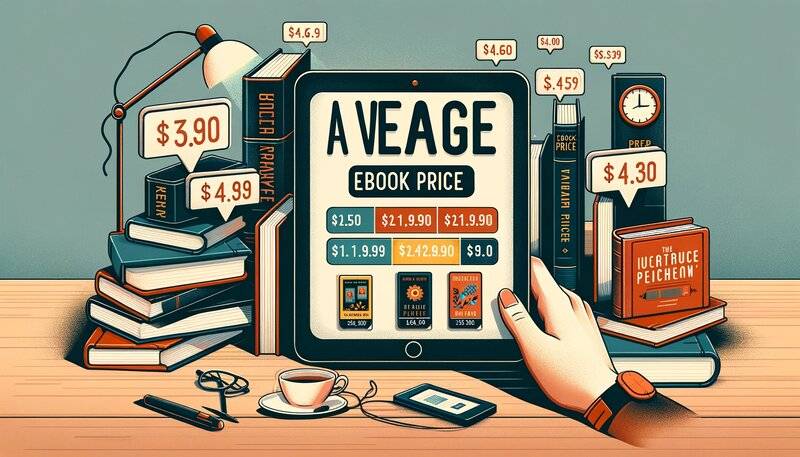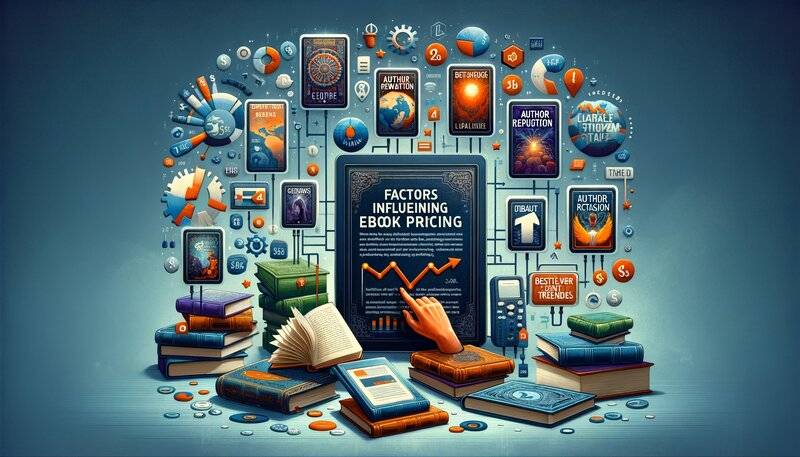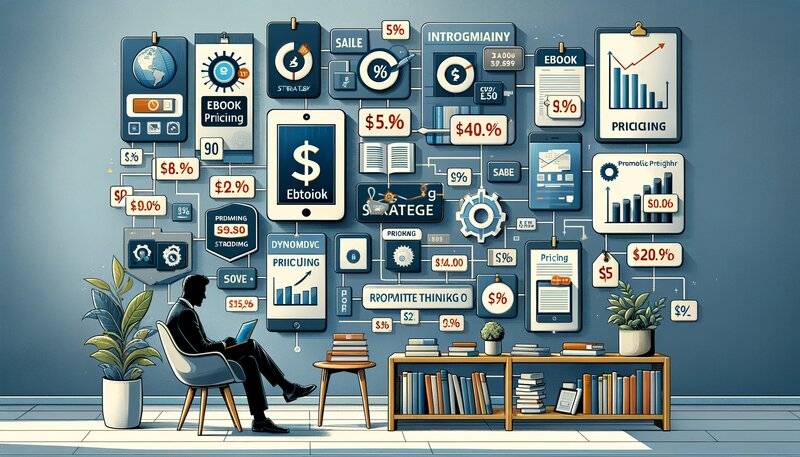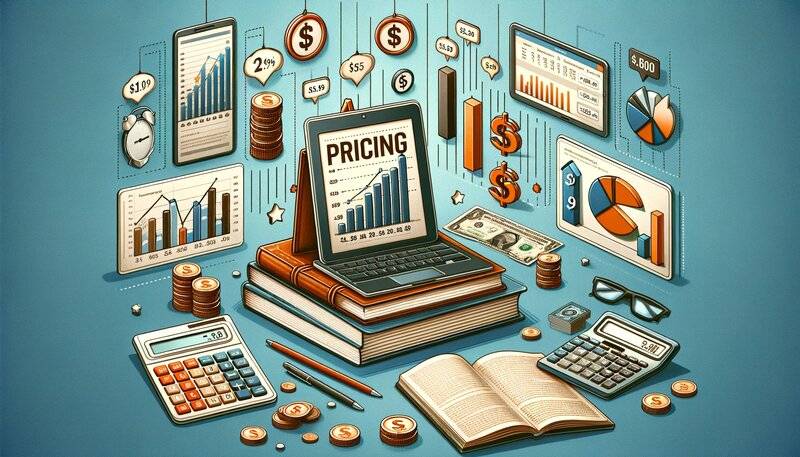When it comes to eBooks, one of the key decisions for authors and publishers is setting the right price. The average eBook price can vary widely, making it a critical and often challenging aspect to navigate in the digital publishing world.
Pricing an eBook appropriately is essential, as it not only affects sales but also how readers perceive the value of the book. Striking the right balance is crucial for success in the competitive eBook market.
In this article, we’ll dive into the factors that influence the average price of eBooks. We’ll explore how genre, author reputation, market trends, and other elements play a role in determining the most effective pricing strategy for eBooks.
Average eBook Price

The price of eBooks is an ever-evolving aspect of digital publishing, influenced by a variety of factors and trends.
Currently, eBook pricing varies significantly across different genres and platforms, which reflects the diverse nature of the digital book market.
One of the main trends in eBook pricing is the influence of genre on the cost.
For instance, popular genres like romance or mystery often have a wide range of prices, some as low as $0.99 to $2.99 for books from new or indie authors, and higher for established authors.
In contrast, specialized non-fiction eBooks, such as academic texts or technical manuals, can be priced significantly higher due to their niche content and smaller, more targeted audience.
The platform on which the eBook is sold also plays a crucial role in pricing.
Major platforms like Amazon Kindle, Apple Books, and Google Play have different pricing strategies and royalty structures, which can influence how authors and publishers set their prices.
For example, Amazon Kindle Direct Publishing (KDP) offers higher royalties for eBooks priced between $2.99 and $9.99, which encourages authors to price within this range.
Furthermore, the shift towards subscription models, like Kindle Unlimited, affects eBook pricing. Authors who enroll their books in these programs often consider the potential earnings from subscription reads versus individual sales.
In other words, the average price of eBooks is shaped by a combination of genre, platform policies, and market trends.
Factors Influencing eBook Pricing

Several key elements play a role in determining the pricing of eBooks, each contributing to how authors and publishers decide what to charge.
Genre and Content Type
Different genres often command different price points in the eBook market.
For instance, literary fiction and in-depth non-fiction typically carry higher prices due to their perceived value and the amount of work that goes into creating them. On the other hand, genres like romance or thrillers might be priced lower to attract a broader audience.
The type of content also influences pricing. For example, a comprehensive guide or a detailed educational resource might be priced higher than a short story or a novella.
Author Reputation and Publishing Status
The author’s reputation has a significant impact on eBook pricing. Well-known authors with a strong fan base can often price their eBooks higher, as their established audience is more likely to pay a premium.
Conversely, new or self-published authors might price their eBooks lower to attract readers and build their audience.
Whether the book is self-published or traditionally published also plays a role. Traditional publishers often have set pricing strategies that reflect their market positioning and brand value, whereas self-published authors have more flexibility in setting their prices.
Market Trends and Competitor Pricing
Staying informed about current market trends is crucial for competitive eBook pricing. Authors and publishers often look at the pricing of similar books in their genre to determine a competitive price point.
If similar eBooks are priced lower, pricing your eBook too high might deter potential readers.
Conversely, pricing an eBook too low might undervalue the content, especially if comparable books are priced higher. Understanding competitor pricing and market trends helps in positioning the eBook effectively in the market.
Overall, a combination of genre, author reputation, publishing status, market trends, and competitor pricing all contribute to the decision-making process behind eBook pricing.
Pricing Strategies for eBooks

When it comes to eBooks, authors and publishers have several pricing strategies at their disposal, each with its own way of attracting readers and maximizing sales.
One common strategy is the introductory low price or promotional pricing. This is often used when launching a new book.
The idea is to set a lower price initially to attract more buyers and generate word-of-mouth buzz. Once the book gains traction, the price can be raised to a standard rate.
This strategy is particularly effective for new authors or series launches, as it encourages readers to take a chance on a book they might not otherwise consider.
Another strategy is price pulsing, where the price of the eBook is temporarily reduced to create urgency and boost sales.
This can be tied to special events, holidays, or as part of a broader marketing campaign. Price pulsing not only stimulates sales during the promotional period but can also lead to increased visibility and higher sales post-promotion.
Dynamic pricing is another approach, where the price of the eBook fluctuates based on demand, competition, and market trends.
This strategy requires constant market monitoring and can be more complex to manage, but it allows for flexible pricing in response to real-time market conditions.
Pricing can also be used as a marketing tool beyond just sales. For instance, some authors offer their eBooks for free for a limited period.
This can be a powerful way to build a reader base, especially for a series where the first book is offered for free to entice readers to purchase subsequent books.
Impact of eBook Pricing on Sales and Revenue

The pricing of an eBook can have a significant impact on both its sales and overall revenue, making it a critical factor in the success of digital publishing. Different pricing points can attract various reader segments and influence buying decisions.
Setting a lower price for an eBook can lead to higher sales volume, especially if the target audience is price-sensitive or if the author is relatively unknown.
This strategy can be particularly effective for genres where readers are accustomed to buying multiple books at a time, like romance or mystery series.
However, while a lower price may increase the number of units sold, it also means lower revenue per book, which must be balanced against the potential for a larger volume of sales.
On the other hand, pricing an eBook higher can contribute to a perception of higher quality or value, which might appeal to certain readers.
This strategy can be effective for established authors with a loyal fan base, or for eBooks offering specialized or niche content. A higher price point can lead to greater revenue per book sold, but it might also reduce the overall number of sales, as some potential buyers could be discouraged by the higher cost.
The key is finding a balance between competitive pricing and maintaining the perceived value of the eBook.
If priced too low, the eBook might be undervalued and fail to cover production costs. If priced too high, it risks alienating a portion of the potential audience.
Authors and publishers must consider their target audience, the nature of their content, and their overall sales and marketing strategy to find the optimal price point.
Conclusion
Understanding the average eBook price is key to success in the digital publishing world. It’s about finding that sweet spot where the price reflects the value of the content without discouraging potential readers. This balance is crucial in a market where pricing can directly impact sales and revenue.
The right pricing strategy for an eBook involves considering various factors like genre, author reputation, and market trends. It’s a decision that can shape the book’s overall success, making it as important as the content itself. Authors and publishers need to stay informed and adaptable to find the most effective pricing approach.
FAQ
Ebook pricing strategy?
An effective eBook pricing strategy balances market trends, genre norms, and author reputation to maximize sales and revenue, so you should carefully take all this into consideration before you set your price.
Ebook pricing by word count
While there’s no strict rule, generally, longer eBooks with more words might be priced higher than shorter ones. Usually, they vary from flash fiction of less than 1000 words at up to $1, to epic fantasy novels of over 120.000 words at about $10 and up.
Ebook prices vs paperback
E-books are typically priced lower than paperbacks due to lower production and distribution costs.
Average price of ebooks on Amazon
The average price of eBooks on Amazon varies but often falls between $2.99 and $9.99, especially for Kindle Direct Publishing.

